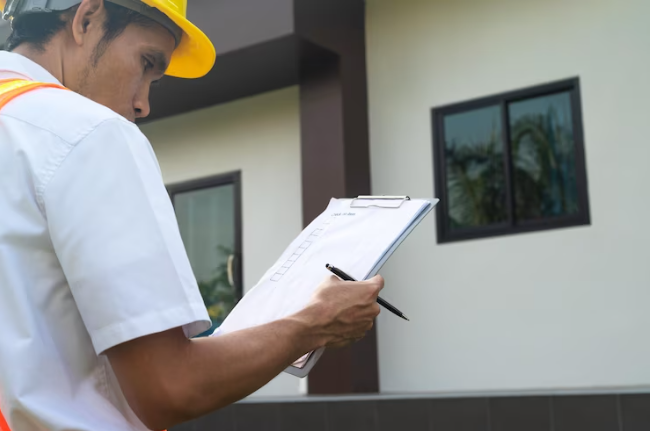Have you ever spent countless hours browsing real estate listings, only to finally find your dream home and realize it needs extensive repairs? It can be a disappointing and stressful experience, but luckily, there is a way to avoid it.
Home inspections are a crucial step in the home buying process that can save you from making a costly mistake. By identifying any necessary repairs, a home inspection can give you peace of mind and help you make an informed decision about your potential investment.
A home inspection is a thorough examination of a property’s structure, systems, and components. It is typically conducted by a qualified home inspector who will provide a detailed report of their findings. Home inspections cover everything from the roof to the foundation and can uncover issues that may not be visible to the untrained eye.
While a home inspection may seem like an added expense, it can ultimately save you money and time in the long run by identifying any necessary repairs and giving you the opportunity to negotiate with the seller.

What a Home Inspection Entails
You won’t believe what’s involved in a thorough home inspection! Before the actual inspection, the inspector will spend some time preparing your home. This includes checking for access to all areas of the house, like the attic and crawl spaces, and making sure that all utilities are turned on.
The inspector will also ask you about any areas of concern that you may have, such as leaky pipes or a damaged roof. This is a good time to discuss any repairs or renovations that you’ve made to the home, as the inspector will need to know about these changes in order to accurately assess the condition of the property.
The benefits of a home inspection are numerous. Not only can an inspection help you identify repair needs that you may not have been aware of, but it can also give you peace of mind knowing that your home is safe and structurally sound. By getting a thorough inspection, you can avoid costly repairs down the line, as the inspector will be able to identify any potential problems before they become major issues.
Additionally, a home inspection can be a helpful tool when negotiating the price of a home. By knowing about any repairs or upgrades that may need to be made, you can negotiate a fair price with the seller.
All in all, a home inspection is an essential part of the home-buying process that can save you time, money, and stress in the long run.
The Importance of a Thorough Inspection
Don’t underestimate the significance of a comprehensive inspection; it can reveal hidden issues that could end up costing you a fortune in the long run.
A thorough home inspection should cover all aspects of the property, from the foundation to the roof, and should include testing for potential issues such as mold, radon, and pests. However, it’s important to acknowledge that inspections do have limitations.
Inspectors can only report on visible issues and cannot see behind walls or under floors, so there may be hidden issues that go unnoticed.
Ignoring the importance of a thorough inspection could lead to potential consequences. Undetected issues could lead to costly repairs down the line or even safety hazards for you and your family.
A comprehensive inspection can also provide negotiation leverage in the home buying process, allowing you to request repairs or a reduction in the asking price if issues are found.
So, don’t cut corners when it comes to inspections; invest in a thorough assessment to ensure your peace of mind and protect your investment.
Common Issues Identified in Home Inspections
It’s common for home inspections to uncover issues that may cause headaches and potentially cost a lot of money in the future. One of the most pressing concerns is foundation issues. Home inspectors are trained to look for signs of foundation problems, such as cracks in the walls or floors, unevenness in the floors, and doors that don’t close properly.
If left unaddressed, foundation problems can lead to serious structural damage, which can be both costly and dangerous.
Another common issue identified in home inspections is electrical problems. Electrical issues can be hazardous, and can lead to fires or other dangerous situations. Inspectors check to ensure that wiring is up to code, that circuits are properly grounded, and that there are no exposed wires or other hazards.
They also look for signs of past electrical problems, such as scorch marks or melted wires. By identifying these issues early on, home inspections can help homeowners prevent costly repairs and ensure the safety and security of their homes.
Making Informed Decisions Based on Inspection Results
Making informed decisions based on the results of a home inspection is crucial for ensuring the long-term safety, stability, and financial well-being of a homeowner. When interpreting findings from an inspection report, it’s important to understand that not all issues identified are equally urgent.
Prioritizing repairs based on the severity of the problem, potential for further damage, and estimated cost can help you allocate your resources effectively. For example, a leaky faucet may be a nuisance, but it poses little risk to the overall safety of the home. On the other hand, a cracked foundation or faulty electrical wiring can have serious consequences if left unaddressed.
By focusing on the most pressing repairs first, you can prevent small problems from becoming larger and more expensive issues down the road. Ultimately, taking the time to understand and prioritize the findings of a home inspection can save you time, money, and headaches in the long run.
Hiring a Qualified Home Inspector
Hiring a qualified home inspector is essential for ensuring the safety and financial well-being of homeowners. According to the National Association of Home Inspectors, 99% of surveyed real estate agents recommend their clients get a home inspection before purchasing a property.
This is because a home inspection can reveal any underlying issues with a property that may not be noticeable during a routine walkthrough. When hiring a home inspector, it’s important to look for someone with the necessary qualifications.
A good home inspector should be licensed, insured, and have ample experience in the field. While cost is also an important factor, it’s crucial not to skimp on quality in order to save a few bucks upfront.
A thorough home inspection can save homeowners thousands of dollars in repair costs down the line, making it a cost-effective investment in the long run.
Frequently Asked Questions
How much does a home inspection typically cost?
When it comes to home inspections, the cost can vary depending on a number of factors affecting the overall price. These factors can include the size and age of the home, the location, and the specific services requested.
It’s important to do your research and shop around, comparing prices from different inspection companies to ensure you’re getting the best value. On average, a home inspection can cost anywhere from $300 to $500, but prices can range higher or lower depending on the aforementioned factors.
Keep in mind that while price is important, it’s also important to choose a reputable and experienced inspector who’ll provide an in-depth and objective analysis of the home’s condition.
Can a home inspection uncover hidden issues within the structure of the home?
You may be surprised to learn that a home inspection can uncover hidden issues within the structure of the home that may not be immediately visible.
From the foundation to the roof, a thorough inspection can reveal structural integrity issues that could potentially cost you thousands of dollars in hidden repairs down the line.
These hidden issues may include things like water damage, mold, and even termite damage.
A home inspector will thoroughly examine the home’s structure to ensure that it is sound and free from any hidden repairs that could be lurking beneath the surface.
So, if you’re considering purchasing a home, it’s essential to invest in a home inspection to ensure that you’re not buying a property with hidden structural issues.
How long does a home inspection usually take?
When it comes to home inspections, the average duration typically falls between two to four hours. However, several factors can affect the duration of the inspection.
The size of the property, the age of the home, the number of systems and components that need inspection, and the accessibility of these systems can all play a role in determining the length of the inspection.
Additionally, if the inspector uncovers any issues during the inspection, they may need to spend more time investigating and documenting these concerns.
Ultimately, the duration of the home inspection will depend on the unique factors present in the home being inspected.
Are there any specific certifications or qualifications that a home inspector should have?
When you’re hiring a home inspector, it’s important to look for certain qualifications, training, and experience to ensure that you’re getting an inspector who meets industry standards and certification requirements.
Many states require home inspectors to be licensed, but even if your state doesn’t, you should still look for an inspector who has completed a comprehensive training program and has experience in the field.
Look for an inspector who is certified by a reputable organization, such as the International Association of Certified Home Inspectors or the American Society of Home Inspectors. These organizations have strict certification requirements and ensure that their members adhere to industry standards.
By choosing an inspector with the right qualifications and experience, you can have peace of mind knowing that your home inspection will be thorough and accurate.
Is it necessary to be present during the home inspection process?
When it comes to home inspections, it’s generally recommended that you be present during the process. There are several benefits to being there, such as being able to ask questions and get a better understanding of any issues that are found.
Additionally, being present can help you identify potential problem areas that may have been missed by the inspector. However, there are also some drawbacks to consider. For example, being present can be time-consuming and may require you to take time off work.
Additionally, if you’re emotionally attached to the home, it can be difficult to remain objective during the inspection. Ultimately, the decision of whether or not to be present during the home inspection process is up to you and should be based on your personal preferences and circumstances.
Conclusion
Now that you understand the importance of a home inspection, you can make an informed decision about hiring a qualified inspector to assess your property. Remember that a thorough inspection can identify potential repair needs that could save you money and headaches down the road.
Coincidentally, as you were reading this article, you may have noticed a small crack in the ceiling or a leaky faucet that you’ve been meaning to fix. Don’t let these issues go unnoticed, as they could be indicative of larger problems that a home inspector could identify.
By taking care of these minor repairs now, you could potentially save yourself from costly repairs in the future. So, schedule that home inspection and tackle those repairs – your home and wallet will thank you.

